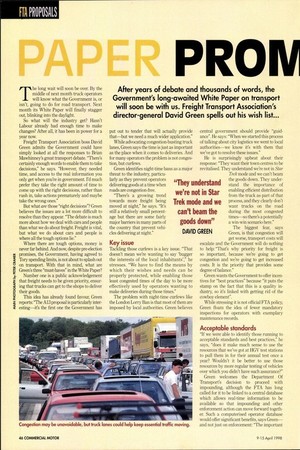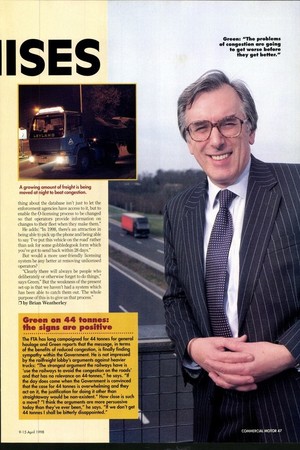PROIII SES After years of debate and thousands of words,
Page 48

Page 49

If you've noticed an error in this article please click here to report it so we can fix it.
the Government's long-awaited White Paper on transport will soon be with us. Freight Transport Association's director-general David Green spells out his wish list... The long wait will soon be over. By the middle of next month truck operators will know what the Government is, or isn't, going to do for road transport. Next month its White Paper will finally stagger out, blinking into the daylight.
So what will the industry get? Hasn't Labour already had enough time to make changes? After all, it has been in power for a year now.
Freight Transport Association boss David Green admits the Government could have simply looked at all the responses to Brian Mawhinney's great transport debate. "There's certainly enough words to enable them to take decisions," he says. "However, they needed time, and access to the real information you only get when you're in government. I'd much prefer they take the right amount of time to come up with the right decisions, rather than rush in, take actions prematurely and maybe take the wrong ones."
But what are those "right decisions"? Green believes the issues are a lot more difficult to resolve than they appear. "The debate is much more about how we deal with cars and people than what we do about freight Freight is vital, but what we do about cars and people is where all the tough options lie."
Where there are tough options, money is never far behind. And now, despite pre-election promises, the Government, having agreed to Tory spending limits, is not about to splash out on transport. With that in mind, what are Green's three "must-haves" in the White Paper?
Number one is a public acknowledgement that freight needs to be given priority, ensuring that trucks can get to the shops to deliver their goods.
This idea has already found favour, Green reports: "The A13 proposal is particularly interesting—it's the first one the Government has put out to tender that will actually provide that—but we need a much wider application."
While advocating congestion-busting truck lanes, Green says the time is just as important as the place when it comes to deliveries. And for many operators the problem is not congestion, but curfews.
"There's a growing trend towards more freight being moved at night," he says. "It's still a relatively small percentage but there are some fairly major barriers in many parts of the country that prevent vehicles delivering at night."
Key issue Tackling those curfews is a key issue. "That doesn't mean we're wanting to say 'bugger the interests of the local inhabitants'," he stresses. "We have to find the means by which their wishes and needs can be properly protected, while enabling those least congested times of the day to be more effectively used by operators wanting to make deliveries during those times."
The problem with night-time curfews like the London Lorry Ban is that most of them are imposed by local authorities. Green believes central government should provide "guidance". He says: "When we started this process of talking about city logistics we went to local authorities—we know it's with them that we've got to resolve these issues."
He is surprisingly upbeat about their response: "They want their town centres to be revitalised. They understand we're not in Star Trek mode and we can't beam the goods down. They understand the importance of enabling efficient distribution from the truck as part of that process, and they clearly don't want trucks on the road during the most congested times—so there's a potentially a win-win scenario here."
The biggest fear, says Green, is that congestion will get worse, transport costs will escalate and the Government will do nothing to help: "That's why priority for freight is so important, because we're going to get congestion and we're going to get increased costs. It is the priority that provides some degree of balance."
Green wants the Government to offer incentives for "best practices" because "it puts the stamp on the fact that this is a quality industry, so it's linked with getting rid of the cowboy element".
While stressing it is not official FTA policy, Green floats the idea of fewer mandatory inspections for operators with exemplary maintenance records.
Acceptable standards "If we were able to identify those running to acceptable standards and best practices," he says, "does it make much sense to use the resources that we've got at HGV test stations to pull them in for their annual test once a year? Wouldn't it be better to use those resources by more regular testing of vehicles over which you didn't have such assurance?"
Green welcomes the Department Of Transport's decision to proceed with impounding, although the FTA has long called for it to be linked to a central database which allows real-time information to be available so that impounding and other enforcement action can move forward together. Such a computerised operator database would offer significant benefits, says Green— and not just on enforcement: "The important thing about the database isn't just to let the enforcement agencies have access to it, but to enable the 0-licensing process to be changed so that operators provide information on changes to their fleet when they make them."
He adds: "In 1998, there's an attraction in being able to pick up the phone and being able to say 'I've put this vehicle on the road' rather than ask for some gobbledegook form which you've got to send back within 28 days."
But would a more user-friendly licensing system be any better at removing unlicensed operators?
"Clearly there will always be people who deliberately or otherwise forget to do things," says Green." But the weakness of the present set-up is that we haven't had a system which has been able to catch them out. The whole purpose of this is to give us that process."
by Brian Weatherley Green on 44 tonnes: the signs are positive The FTA has long campaigned for 44 tonnes for general haulage and Green reports that the message, in terms of the benefits of reduced congestion, is finally finding sympathy within the Government. He is not impressed by the railfreight lobby's arguments against heavier trucks: "The strongest argument the railways have is 'use the railways to avoid the congestion on the roads' and that has no relevance on 44-tonnes," he says. "If the day does come when the Government is convinced that the case for 44 tonnes is overwhelming and they act on it, the justification for doing it other than straightaway would be non-existent." How close is such a move? "I think the arguments are more persuasive today than they've ever been," he says. "If we don't get 44 tonnes I shall be bitterly disappointed."










































































































